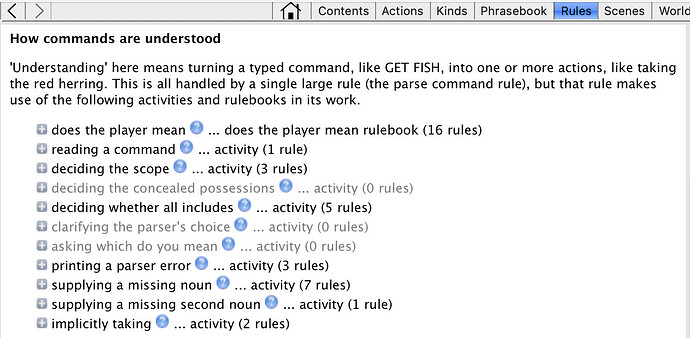other things that would be nice; I apologize that some are vague, but I’m brainstorming before needing to get to work…
activities
list of
deciding the concealed possessions of something
deciding the scope of something
[...]
…as well as rulebooks, list of and rules, list of.
The docs don’t really define “literal” in the programming sense, but I would find it helpful if, on a per kind basis, there were a literal sub-entry with sections regarding how one can/must make such literals, plus a literals entry listing the kinds with the same info. (I still always get adding “action” for action names wrong the first time…)
objects currently has see things and that’s unfortunate, 'cause they’re not the same. (But, of course, sometimes “thing” really means object and the docs don’t always spell that out as clearly as they might.)
properties currently doesn’t have entries discussing defining defaults; it could have, maybe,
properties
default values
seldom
usually
definition with "with" tucked almost invisibly into one code example in WI 4.2
There’s not an entry for inference and having entries for both the “how the compiler creates the world” and the parsing sense would be good.
condition, naming properties could be a little more clear, like condition, as name for an enumerated kind of value as property
parsing just has see understanding and I think it probably warrants its own entry including sections like related activities and rulebooks.
oops and again don’t have entries. And oops, again, undo would be suitable sub-entries for a parsing entry.
if we have… as in “if we have [actioned] [the particular object]” should have its own entry and its own sub-entry under conditionals, historical.
The listing for topics omits a significant section: 18.33 Activities > Reading a Command.
visibility has a subentry for requirement in defining actions. I’d suggest removing that entry and adding a separate entry for visible thing to not contribute to the conflation of the concepts.
Likewise, it’d be relevant to have touchable thing, carried thing in regard to action specifications; the existing entries for these are for the touchable and carried adjectives; I think those entries would better omit “thing”. thing should get subentries for in action specifications: carried thing, touchable thing, visible thing.
